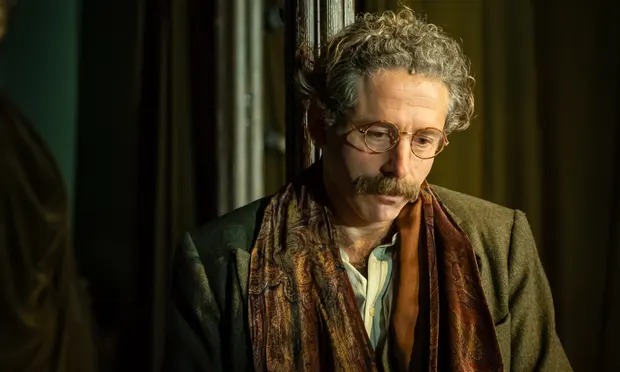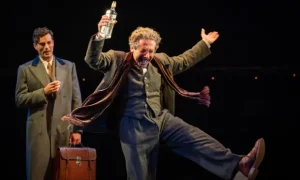
Elliot Levey as Herr Schultz - Photograph: Marc Brenner
As Jews prepare to recount the escape from Egypt over the Seder night, the Olivier award-winning actor reflects on his personal connection to the Ukrainian conflict
his Friday sees the beginning of Passover. It’s the liberation story of the Jewish people: the journey from slavery to freedom. I’m sitting in my dressing room – the “Isherwood room”, named after the writer whose Berlin Stories gave birth to our production of Cabaret – with 10 extraordinarily liberated people. There are more pierced nipples and “wearable erotic accessories” in here than this sheltered man from Muswell Hill could shake a stick at. So, I keep my painfully heteronormative stick to myself.
A few seats away sits my friend Matt who plays Hans in the show, a specialist in obscure sexual practices: art and life have never been more attuned. He’s wearing lederhosen and glitter, polishing some sort of leather harness. “What’s that for?” I ask. “I’m going to a club after this evening’s show, where I’m strapped on to a sling and penetrated throughout the night.” “Wow,” I say. “How extraordinary.” “Not really, mate. For me it’s just like shaking hands.”
Well, buckle up Matt and let me tell you about the time I escaped from the original “house of bondage” three and a half thousand years ago. On Passover, Jews relive the exodus from Egypt as if it were happening to us now. We don’t just tell the story, we reenact it. We gather for the Seder night and recount through story, food and song our escape from slavery under the Pharaoh – our “deliverance from the house of bondage to the promised land”. It’s biblical cosplay – with matzah. That’s the unleavened bread we eat to remind ourselves that we had to flee Egypt in the dead of night – without time for the bread to rise – before the Pharaoh changed his mind. And we eat bitter herbs to remind us of the tears we cried in our anguish as enslaved people. We drink wine to celebrate our escape and spill wine to remind us of the drowning of our enemies in the Red Sea and the plagues they suffered.
Emotional paradoxes are a Jewish tradition. Laughter needs tears. Happiness always needs its opposing corollary. Is it an injunction or just superstition that makes us eschew unadulterated joy? Even during a wedding ceremony, at the very moment of unity, a glass is smashed to remind us of the destruction of the temple (in our production of Cabaret, there is a further link to Kristallnacht). But the Seder story makes another crucial antithetical connection, which has become part of the Jewish intellectual DNA: hope shares centre stage with caution. We recite from the Haggadah: “Not just Pharaoh, but in every generation there are those who rise against us to annihilate us” and every year we marvel at the pessimistic prescience of the third-century sages who wrote it.
If fearing the worst is a tribal habit, drummed into us at every Passover, then the loss of that fear has also become part of our collective cautionary tale telling. My character in Cabaret, the Jewish greengrocer, Herr Schultz, like so many of his generation, assumes that the superstitious injunction to be fearful of despots no longer applies in the enlightened world of Germany. He refuses to acknowledge the growing danger. His hope that the Nazi threat will pass is not counterbalanced by the ancient tribal command to fear the worst. He shrugs off his friend Clifford’s advice to leave, and “dramatic irony” – the audience’s gift of hindsight – allows us to assume the worst fate befalls him. To have hope and ignore its lurking shadow is not a recipe in the Jewish cookbook.
But if the Seder is a sort of preparedness drill, an annual escape dress-rehearsal, then the message is not lost on us this year. As we were rehearsing and discussing Schultz’s naive optimism, the thought of a Russian invasion would be dismissed as alarmism, even though Putin’s troops were amassing on the border. Ukrainians went about their daily business. Greengrocers sold their fruit. Weeks later, and the booby-trapped bodies of Bucha make the 10 plagues of the Passover story seem tame. Unimaginable horrors are being perpetrated by the capricious hand of this generation’s Pharaoh. And we are unprepared. Hope has lost its bedfellow.
The Passover Seder is an evening of paradoxes. It is prophetic and discomforting, while also a joyous meal of celebration and ancient drinking games. Wine is drunk leaning to the left to mimic Roman aristocrats and glasses must be filled, finished, and refilled according to a set plan that no one has ever agreed on. We even have an extra cup of wine for Elijah the prophet: we open the front door and sing a song to welcome in Eliyahu Hanavi – the eternally wandering Jew, the forever refugee, the stranger in a strange land – to seek asylum in our home. Children stare at the glass to see if he has taken a sip while the adults gently knock the table.
But Elijah isn’t just a Jewish Santa to keep the kids awake. Yes, he is the bringer of good news and joy but also the spectre at the feast. As the door opens, we feel the chill wind of reality. Elijah speaks for all of Earth’s wanderers, all those looking for shelter. With millions of Ukrainians fleeing war, his arrival is salutary. Today’s exodus doesn’t require historical reenactment at the Seder meal. It is playing out in real time and despite the thousands of people signing up to host refugees, scandalously few have made it to a place of greater safety.
This year, maybe because my character Herr Schultz failed to escape, I will be thinking about a man who succeeded. A Ukrainian, also called Elijah, who listened to the ancestral warning of Passover and made the decision to flee his home town of Kyiv, after two of his brothers were killed because a new despot had arisen with a taste for violence, just like the Pharaoh. He was lucky enough to find asylum in the UK. But, however current his story sounds, this was a long time ago. Elijah Zivatovsky of Kyiv was my grandfather. There is an exodus in every generation.
So, when we open the door during the Seder meal for Elijah the prophet we welcome in the original time-traveller. He comes from another time to shake us out of our docility and acquiescence. He enters the party like an embodiment of relativity. The personification of history repeating itself. Here to unsettle us and call us to action. Can we call ourselves free if others are still in bondage?’
I notice that Matt has stopped his polishing. “Fascinating stuff, Elliot. Seder night sounds like a lot of fun.” “Why don’t you join us on Friday after the show, if you’re not too tied up?” “I’ll be there with knobs on,” says Matt.
And I decide to get ready for the show …

